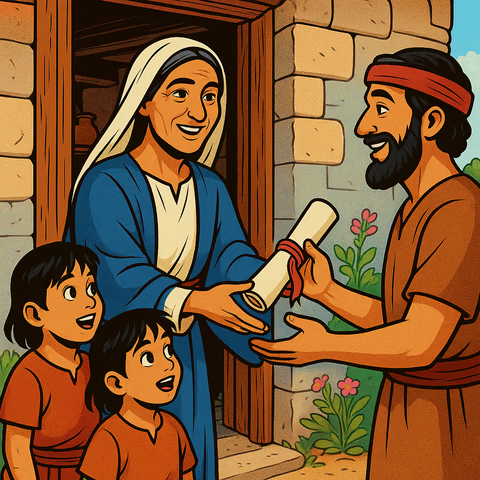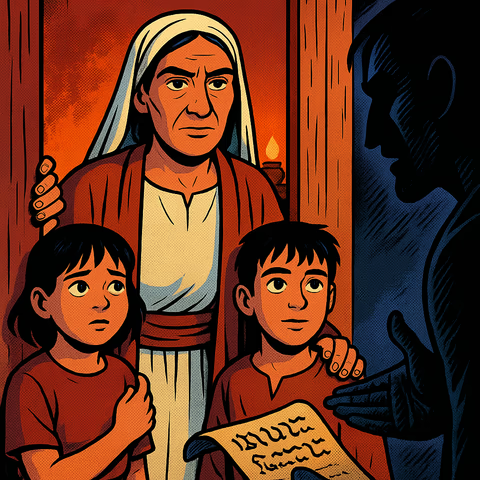
2 John
From the Greek Codex Sinaiticus
About
A letter, traditionally understood to be from Jesus’Yeshua’sIshoa’s Apostle John, to ‘the chosen lady and to her children.’
However, if it was written by the Apostle John, then he may have used one or more secretaries, because there are specific differences in the writing styles between all the works traditionally attributed to him.
Not accepted by Aramaic speakers at first
The Aramaic version of this letter was probably translated from Greek several centuries after it was first written. Therefore, the Aramaic is not very helpful when translating this text, as it was translated so late that it would just copy across any early corruptions in the Greek. For this reason, we don’t automatically defer to the Aramaic text in this book if it disagrees with the Greek. If we do, it will be marked in a translator note.
This happened because 2 John was one of the ‘Western Five’ books (2 Peter, 2 John, 3 John, Jude, and Revelation) that were not originally accepted as inspired by Aramaic-speaking Christians, and were therefore not included in the Peshitta (the standard Aramaic/Syriac Bible) until later. They may have believed it to be a genuine letter from the Apostle, but believing that a letter is genuine and believing it’s inspired are two very different things.
- Learn more about what Bible books are inspired.
- See our timeline on Bible canon formation.
Source
We’ve translated it from Codex Sinaiticus, one of the oldest and most complete Greek manuscripts dating from the 300s AD.
Translation
- Known and suspected fake words and phrases commonly included in popular translations are
[greyed-out], followed by a link to our spurious texts article. - Alternative translations and editor notes appear [like this].
- Text that’s missing from our source manuscript, but filled in from another source, is marked with [[double brackets]].
- All circumlocutions for God’s Name appear as '[Jehovah][Yahweh]“Lord”'. You can change this to '[Yahweh]' or “Lord” in your settings.
- Many names use CamelCase to show where they contain references to different Gods, e.g. IsaiAh, JeruSalem, etc. Learn why. You can toggle these on or off in your settings.
- The original texts had no chapter or verse numbers, paragraph breaks, line breaks, margins, punctuation, or capital letters. These are all added for clarity, but be aware that they can sometimes subtly alter the meaning. Learn more.
- Words [inserted] by the translator for clarity are always in [brackets]. These are not part of the original source text. Learn more.
Approval
This translated text has been proofread against our original Greek source manuscript. It was approved by the editor on July 19, 2025.
1
Introduction
1The older man, to the chosen lady and to her children whom I truly love… And not just from me, but from all those who have come to know the truth 2because the truth that exists in us will continue to be with us into the age.
3[May you have] kindness, mercy, and peace from God [the] Father and from JesusYeshuaIshoa the Anointed One (the Son of the Father) in truth and love.
Walk in His Commandments
4I’m so very happy, now that I’ve found out that your children are still walking in the truth and following the commandments that we received from the Father. 5So I’m begging you lady (I’m not writing you a new commandment, just one that we’ve had since the beginning) to love each other.
6And this is the love: That we walk according to his commandments!
Yes, that’s his commandment! It’s just as you’ve heard from the beginning… Yes, you should walk in it. 7Because, many impostors have gone out into the world and do not confess that JesusYeshuaIshoa the Anointed One is coming in the flesh… This [one] is the deceiver and the fake anointed one.
8So watch out for yourselves!
Be careful not to lose the things you’ve worked [so hard] on, but rather, may you receive [a] full reward!
Avoid Deceivers

9For everyone who runs ahead and doesn’t stay in the Anointed One’s teaching doesn’t have God, [while] the one who remains in the teaching has both the Father and the Son.
10Therefore, if anyone comes to you and doesn’t bring this teaching [anymore], don’t let him into your home, nor wish him well, 11for the one who wishes him well is then sharing in his wicked actions.
12Although I have many [other] things to write to you, I didn’t want to do it with paper and ink. Rather, I’m hoping to come and speak to you face to face, so our joy can be realized.
13The children of your chosen sister send you their greetings.
Creative Commons License
This translated text and any accompanying artwork and audio is freely available to everyone under the Creative Commons BY-NC-ND 4.0 license.
You're welcome to copy, share, print, and quote it as long as you give attribution to the 2001 Translation, it's not used for commercial purposes, and that no derivative works are created from it. Learn more.